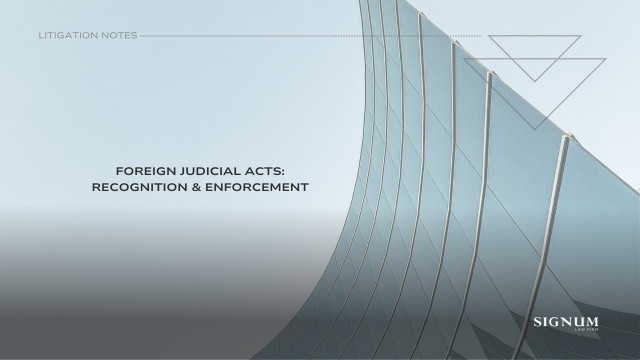Foreign Judicial Acts: Recognition & Enforcement
March 13, 2024
We would like to highlight a rare case from our practice. A client of ours engaged in a distribution agreement with a Kazakh LLP. After the agreement expired, both parties had claims to each other regarding the performance of the agreement. The agreement stipulated that any disputes would be resolved by Dutch courts. The litigation resulted in that both the first instance court and the court of appeal ruled in favor of our client, ordering the LLP to refund certain amount. Since the LLP had no assets abroad, our client was forced to seek an enforcement of the Dutch judicial acts through Kazakh courts.
Article 501(1) of the Code of Civil Procedure (CCP) stipulates that Kazakh courts shall recognize and enforce foreign judicial acts if such recognition and enforcement are provided either (1) by legislation, (2) by an international treaty ratified by Kazakhstan, or (3) on the principle of reciprocity.
According to the literal meaning of this article, meeting any of the listed conditions is sufficient for recognition and enforcement of foreign court judicial acts in Kazakhstan.
At the same time till December 2023, the Normative Ruling of the Supreme Court of the Republic of Kazakhstan dated 11 July 2003 No. 5 “On Court Decision in Civil Cases” (p.30) limited the recognition of foreign judicial acts only to cases when it was stipulated by the legislation or an international treaty, without mentioning the principle of reciprocity.
The Commentary to the CCP (compiled by a team of authors under the guidance of K.A. Mami, PhD, Astana, 2016) offers an interesting view on Article 501(1) of the CCP, asserting that the recognition and enforcement of foreign judicial acts adhere to the principle of reciprocity provided in bilateral international treaties. The Commentary further develops that the reciprocity implies that both contracting parties share a similar approach regarding the recognition and enforcement of court rulings and arbitral awards of each other. While we do hold our own perspective on this matter, it seems that commenting the Commentary falls beyond the scope of this note.
The review of the available court practice shows that the majority of cases regarding the recognition and enforcement of foreign rulings relates to the judicial acts from the countries Kazakhstan has international treaties with. So, in these cases, there's no dispute about whether the foreign judicial acts should be recognized. Instead, the parties only argue about procedural issues such as the court’s competence, , whether the defendant was properly notified, whether the public policy is applicable, as well as whether the case documents meet requirements as per their content and execution.
There are not many legal precedents on recognizing and enforcing foreign judicial acts basing on the legislation or reciprocity principle.
Since there are no international treaties between Kazakhstan and the Netherlands regarding the recognition of judicial acts, our position was grounded on the principle of reciprocity.
We immediately faced some practical questions: How do we prove the reciprocity? How do we prove that the judicial acts became valid?
The Dutch lawyers advised that they are not aware of any cases where Dutch courts have recognized and enforced Kazakh judicial acts. As a result, our strategy was to demonstrate to the Kazakh court that Dutch courts can, in theory, recognize and enforce judicial acts of any country, including Kazakhstan, provided that such acts meet specific criteria.
Unlike the typical for Kazakhstan practice of stamping the validity mark directly on judicial act, Dutch courts do not practice the same. Therefore, we had to obtain the confirmation from the Dutch Supreme Court that the absence of appeals against acts of lower courts makes such acts valid.
During the litigation the debtor's arguments relied entirely on the absence of international treaties between Kazakhstan and the Netherlands. Consequently, we are unaware of potential counterarguments against the reciprocity principle and of how the court would have evaluated them.
The court decided that Dutch judicial acts must be recognized and enforced in Kazakhstan. The court of appeal upheld the conclusions of the lower court and also made reference to the New York Convention, although it did not provide reasoning for doing so.
What is the implication of this case? The CCP clearly allows recognizing and enforcing foreign judicial acts basing on the reciprocity, although the Supreme Court of the Republic of Kazakhstan did not explicitly specify reciprocity as a valid ground until December 2023. Since there are no significant precedents, it's unclear how to prove the reciprocity – either through actual examples when foreign courts recognized Kazakh judicial acts or by mere referring to the potential possibility of such recognition. In practice, we anticipate that each judge will make individual decision regarding the existence of the reciprocity.


